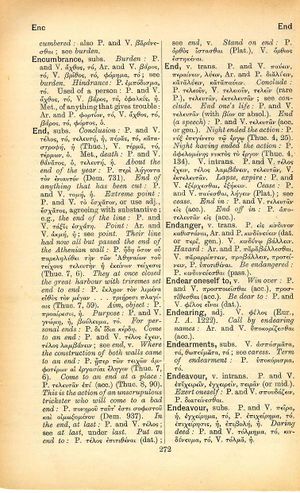end: Difference between revisions
ἔοικα γοῦν τούτου γε σμικρῷ τινι αὐτῷ τούτῳ σοφώτερος εἶναι, ὅτι ἃ μὴ οἶδα οὐδὲ οἴομαι εἰδέναι → I seem, then, in just this little thing to be wiser than this man at any rate, that what I do not know I do not think I know either
mNo edit summary |
mNo edit summary |
||
| Line 55: | Line 55: | ||
===verb intransitive=== | ===verb intransitive=== | ||
P. and V. [[τέλος]] [[ἔχειν]], [[τέλος λαμβάνω]], [[τέλος λαμβάνειν]], [[τελευτᾶν]], V. [[ἐκτελευτᾶν]]. | |||
[[lapse]], [[expire]]: P. and V. [[ἐξέρχομαι]], [[ἐξέρχεσθαι]], [[ἐξήκειν]]. | [[lapse]], [[expire]]: P. and V. [[ἐξέρχομαι]], [[ἐξέρχεσθαι]], [[ἐξήκειν]]. | ||
Revision as of 12:42, 6 June 2020
English > Greek (Woodhouse)
substantive
conclusion: P. and V. τέλος, τό, τελευτή, ἡ, πέρας, τό, καταστροφή, ἡ (Thuc.), V. τέρμα, τό, τέρμων, ὁ.
Met., death: P. and V. θάνατος, ὁ, τελεστή, ἡ.
about the end of the year: P. περὶ λήγοντα τὸν ἐνιαυτόν (Dem. 731).
end of anything that has been cut: P. and V. τομή, ἡ.
extreme point: P. and V. τὸ ἔσχατος or use adj., ἔσχατος, agreeing with substantive; e. g., the end of the line: P. and V. τάξις ἐσχάτη.
point: Ar. and V. ἀκμή, ἡ; see point.
their line had now all but passed the end of the Athenian wall: P. ἤδη ὅσον οὐ παρεληλύθει τὴν τῶν Ἀθηναίων τοῦ τείχους τελευτὴν ἡ ἐκείνων τείχεσις (Thuc. 7, 6).
they at once closed the great harbour with triremes set end to end: P. ἔκλῃον τὸν λιμένα εὐθὺς τὸν μέγαν . . . τριήρεσι πλαγίαις (Thuc. 7, 59).
aim, object: P. προαίρεσις, ἡ.
purpose: P. and V. γνώμη, ἡ, βούλευμα, τό.
for personal ends: P. διʼ ἴδια κέρδη.
come to an end: P. and V. τέλος ἔχειν, τέλος λαμβάνειν; see end, v.
where the construction of both walls came to an end: P. ᾗπερ τῶν τειχῶν ἀμφοτέρων αἱ ἐργασίαι ἔληγον (Thuc. 7, 6).
come to an end at a place: P. τελευτᾶν ἐπί (acc.) (Thuc. 8, 90).
this is the action of an unscrupulous trickster who will come to a bad end: P. πονηροῦ ταῦτ' ἐστι σοφιστοῦ καὶ οἰμωξομένου (Dem. 937).
in the end, at last: P. and V. τέλος; see at last, under last.
put an end to: P. τέλος ἐπιτιθέναι (dat.); see end v.
stand on end: P. ὀρθὸς ἵστασθαι (Plat.), V. ὄρθιος ἑστηκέναι.
verb transitive
P. and V. παύειν, περαίνειν, λύειν, Ar. and P. διαλύειν, καταλύειν, καταπαύειν.
conclude: P. τελεοῦν, V. τελειοῦν, τελεῖν (rare P.), τελευτᾶν, ἐκτελευτᾶν; see conclude.
end one's life: P. and V. τελευτᾶν (with βίον or absol.).
end (a speech): P. and V. τελευτᾶν (acc. or gen.).
night ended the action: P. νύξ ἐπεγένετο τῷ ἔργῳ (Thuc. 4, 25).
night having ended the action: P. ἀφελομένης νυκτὸς τὸ ἔργον (Thuc. 4, 134).
verb intransitive
P. and V. τέλος ἔχειν, τέλος λαμβάνω, τέλος λαμβάνειν, τελευτᾶν, V. ἐκτελευτᾶν.
lapse, expire: P. and V. ἐξέρχομαι, ἐξέρχεσθαι, ἐξήκειν.
cease: P. and V. παύεσθαι, λήγειν (Plat.); see cease.
end in: P. and V. τελευτᾶν εἰς (acc.).
end off in: P. ἀποτελευτᾶν εἰς (acc.).

